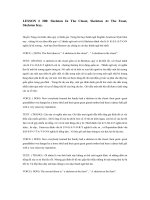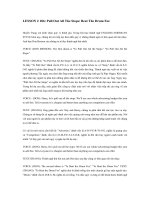Tài liệu ORAL TOPIC – 2 pptx
Bạn đang xem bản rút gọn của tài liệu. Xem và tải ngay bản đầy đủ của tài liệu tại đây (56.1 KB, 5 trang )
ORAL TOPIC – 2
5-The legislative of the UK
The main legislative body in Britain is the Parliament. It is one of the
oldest representative authorities in the world. The historical organs of the
British Parliament are the councils that in early times were appointed to
advise the King.
The British Parliament consist of two house: the House of Commons
and the House of Lords. The role of the house of Lords is restricted to
revising the legislation passed by the House of Commons and it can only
delay the enactment of some bills.
New laws can only come into force when thay have passed through
Parliament. A bill is a proposal for new law. It must have three readings
and then receive Royal Assent from the Queen.
Britain’s constitution ia an unwritten one. Conventions are important
in the British Government system because they regulate those parts of it
that aren’t convered by Acts of Parliament. Conventions are mostly based
on precedents.
Parliament has direct and exclusive control over legislation. It can
make new laws, replace any of the laws already in force with other laws,
turn conventions into laws, or even overturn established conventions. The
accountbility of Government is ensured by two constitutional
conventions.
6-The Government of the UK
The government of the UK consist of the ministers who are appointed
by the Crown on the recommendation of the prime Minister who is
appointed directle by the Crown and is the leader of the political party
which at the time has a majority of seats in the House of Commons.
The Prime minister is the head of the government and presides over
meetings of the Cabinet, consults and advise the Monarch on government
business, supervises and to some extent coordinates the work of various
ministries and departments and is the principal spokesman for the
government in the House of Commons. He also makes recommendation
to the Monarch on many important public appointments, including the
Lord of Chieft Justice, Lord of Appeal on Odinary and Lords Justice of
Appeal.
The Cabinet is the nuclear of the government and its members are
selected by the Ptime minister, to run the most important ministries
whereas the government consists of all minister selected by the Crown to
run the whole country on the Prime Minister’s recommendation.
7- The Judiciary in the SRV
The Judiciary in the SRV consist of the People’s Court and the
People’s office of Supervision and Control.
The system of the People’s Court consists of the Supreme People’s
Court, the local People’s Court, the Military Tribunals and other tribunals
setablished by law and a Special tribunal is established under specia
circumstances.
The tenure of office of the President of the Supreme people’s Court
shall be the same as that of the NA (every five years) whilw that of the
judges and people’s asserors will be determined by law.
During a trial, judges and assessors are independent and shall only
obay by law. The People’s Court shall hold its hearings in public, except
in cases determined by law. The people’s court shall try their case
collegially and their decisions shall conform to the will of the majority.
8- The Local Authorities in Vietnam
In the SRV, local authorities refer to the people’s Councils and
peopple’s Committees in the local administrative units, i.e province and
cities under direct central rule; rural and urban districts, provincial cities
and towns; communes, wards and township.
The People’s Council is the organ of state power, it represents the
will, aspirations and mastery of the people; it is elected by the lacal
people and is accountable to them and to superior state organs. The main
function of the People’s Council is pass resolutions on measures ffor the
implememtation of the Constitution and the law at local level and others
fields.
The people’s Committee, elected by the People’s Council, is the
latters excutive organ, the organ of state administration ai the locality. Its
responsibility is to implement the Constitution, the law, the formal
written orders of superior state organs and the resolution of the People’s
Council.
Notes: Mọi người nhớ để ý lỗi chính tả chút nha!









